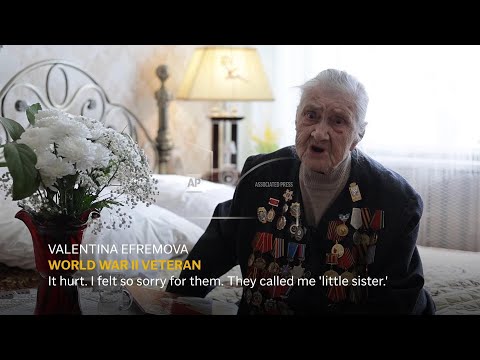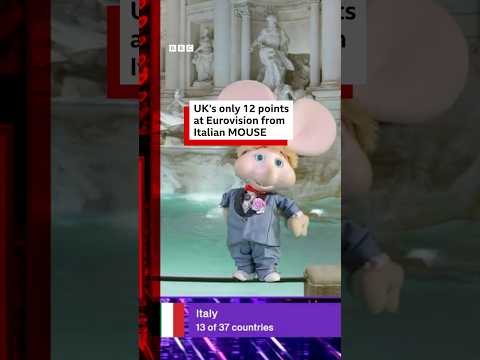(5 May 2025)
RESTRICTION SUMMARY:
++PLEASE NOTE: AP IS OPERATING IN RUSSIA ACCORDING TO RUSSIAN RESTRICTIONS ON ALL REPORTING RELATED TO THE ONGOING MILITARY OPERATION IN UKRAINE++
ASSOCIATED PRESS
Yakutsk, Russia – 18 April 2025
1. Various of World War II veteran Valentina Efremova putting on jacket with medals
2. Close of medals
3. SOUNDBITE (Russian) Valentina Efremova, World War II veteran:
"When wounded soldiers our age were brought in, I cried. It hurt. I felt so sorry for them. They called me ‘little sister.’ But I pulled myself together. I came from a very disciplined family."
4. Efremova showing war photographs
5. Efremova looking at photographs on the wall
6. Close of painting showing Efremova and a soldier
7. Photograph of Efremova
8. SOUNDBITE (Russian) Valentina Efremova, World War II veteran:
"The emotions were overwhelming. I couldn’t believe it. Was it really true, or maybe it wasn’t? There was so much uncertainty. It was only when dispatches and official orders from our army started coming in that we believed our top leadership that real, peaceful life had truly begun."
9. Photograph of Efremova
STORYLINE:
When the news of the Nazi capitulation in WWII reached Valentina Efremova 80 years ago, the now 101 years old Russian veteran says she couldn’t believe the devastating war that claimed 27 million Soviet lives was over.
Efremova served as a nurse in field hospitals on the front lines of the Red Army throughout the war and the apartment she shares with her daughter in Russia’s Far Eastern city of Yakutsk is decorated with numerous war-time photos. Dozens of medals weigh heavily on her jacket.
A 17-year-old high school student, she lived with her family in a small town north of Moscow when the Nazis attacked the Soviet Union in June 1941. She was happy to finish her 8th grade and enjoy vacations. But then war was declared.
Efremova was first drafted to dig trenches outside Moscow. After several weeks, she volunteered to help out the army medics and started working in field hospitals.
"When wounded soldiers our age were brought in, I cried," recalls Efremova. "It hurt. I felt so sorry for them."
She worked as a military nurse for the next four years, moving around the country with her division.
She tended wounds, fed and dressed soldiers, played guitar, and sang to her patients.
"They called me ‘little sister,’" she adds.
By the end of the war, she carried three war wounds, including one that makes her limp to this day.
Efremova was having lunch not far from Kaliningrad in Western Russia on May 9, 1945, when she heard gun shots.
Efremova’s first thought was that it was yet another Nazi attack, but it turns out it was Russian officers firing shots into the air, celebrating victory.
Efremova remembers the joyous moment to this day and says that until the orders and dispatches from the army started flowing in, she couldn’t believe the peaceful life was about to begin.
80 years later, amid ongoing fighting in Ukraine, she can’t think of anything else but living in peace, harmony, and friendship.
===========================================================
Clients are reminded to adhere to all listed restrictions and to check the terms of their licence agreements. For further assistance, please contact the AP Archive on: Tel +44(0)2074827482 Email: info@aparchive.com.
Find out more about AP Archive: http://www.aparchive.com/HowWeWork
Twitter: https://twitter.com/AP_Archive
Facebook: https://www.facebook.com/APArchives
Instagram: https://www.instagram.com/APNews/
You can license this story through AP Archive: http://www.aparchive.com/metadata/youtube/5146588a08774d78b48b6512bb698605
Author: AP Archive
Go to Source
News post in May 10, 2025, 3:05 am.
Visit Our Sponsor’s:
News Post In – News





